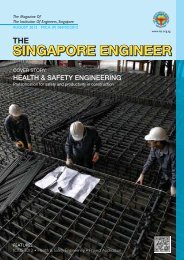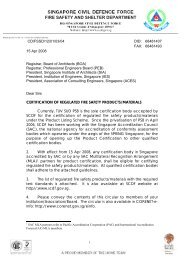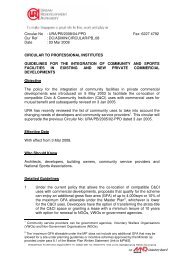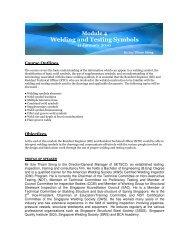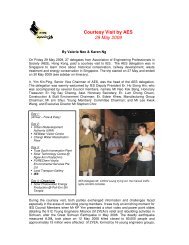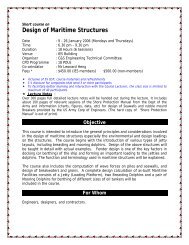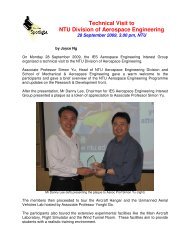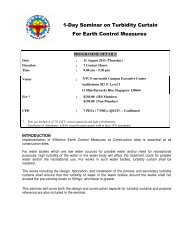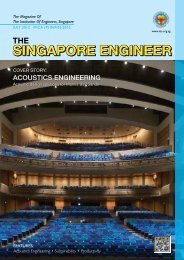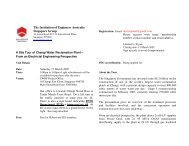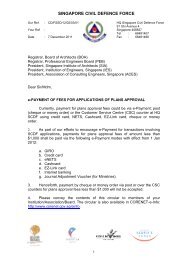THE SINGAPORE ENGINEER - Institution of Engineers Singapore
THE SINGAPORE ENGINEER - Institution of Engineers Singapore
THE SINGAPORE ENGINEER - Institution of Engineers Singapore
You also want an ePaper? Increase the reach of your titles
YUMPU automatically turns print PDFs into web optimized ePapers that Google loves.
NEWS COVER STORY<br />
Environmental biotechnologist wins<br />
Lee Kuan Yew Water Prize 2012<br />
<strong>Singapore</strong> International Water Week recently announced that<br />
environmental biotechnologist Pr<strong>of</strong> Mark van Loosdrecht has<br />
been awarded the Lee Kuan Yew Water Prize 2012 for his<br />
breakthrough contributions in creating sustainable solutions in<br />
the field <strong>of</strong> wastewater treatment.<br />
The highlight <strong>of</strong> the <strong>Singapore</strong> International Water Week, the<br />
Lee Kuan Yew Water Prize is an international water award that<br />
recognises outstanding contributions towards solving global<br />
water problems by either applying technologies or implementing<br />
policies and programmes which benefit humanity.<br />
Pr<strong>of</strong> van Loosdrecht is responsible for introducing a paradigm<br />
shift in the understanding <strong>of</strong> the used water treatment process.<br />
As the fifth recipient <strong>of</strong> the Lee Kuan Yew Water Prize, chosen<br />
from over 61 illustrious nominations received from across 25<br />
countries, Pr<strong>of</strong> van Loosdrecht is recognised for pioneering<br />
an innovative biological process that provides a cost-effective,<br />
robust and sustainable way to remove unwanted pollutants from<br />
used water. This was made possible by the discovery <strong>of</strong> a unique<br />
group <strong>of</strong> bacteria which removes pollutants in used water using<br />
less oxygen and with no added organic carbon, compared to<br />
conventional processes.<br />
Pr<strong>of</strong> van Loosdrecht’s process, named Anammox, can greatly<br />
reduce the overall energy consumption, chemical usage and<br />
carbon emissions <strong>of</strong> conventional used water treatment plants.<br />
The use <strong>of</strong> Anammox shortens the conventional used water<br />
treatment process, where ammonia, a pollutant in used water is<br />
converted to harmless nitrogen gas, bypassing an intermediate<br />
nitrate form which is produced in the conventional used water<br />
treatment process.<br />
At the heart <strong>of</strong> the Anammox process is a group <strong>of</strong> bacteria that<br />
possesses a unique set <strong>of</strong> enzymes which enables them to convert<br />
ammonia to harmless nitrogen gas. The end result is a significant<br />
reduction in the energy consumption in used water treatment.<br />
Currently, used water treatment is an energy-intensive process.<br />
It is estimated that in most industrialised countries, the energy<br />
used in the water cycle takes up about 1% to 3% <strong>of</strong> a country’s<br />
total energy budget. A part <strong>of</strong> this energy may be considered<br />
wasted as the end product <strong>of</strong> used water treatment is discarded<br />
back into the environment.<br />
However, with the application <strong>of</strong> Pr<strong>of</strong> van Loosdrecht’s Anammox<br />
technology in used water treatment, biological nitrogen removal<br />
systems worldwide will see substantial energy savings.<br />
Commenting on Pr<strong>of</strong> van Loosdrecht’s achievement, Mr Tan Gee<br />
Paw, Chairman <strong>of</strong> the Lee Kuan Yew Water Prize Nominating<br />
44 <strong>THE</strong> <strong>SINGAPORE</strong> <strong>ENGINEER</strong> April 2012<br />
Committee said, “Pr<strong>of</strong><br />
van Loosdrecht’s<br />
technology is set to<br />
create a paradigm shift in<br />
the used water treatment<br />
industry. The adoption<br />
<strong>of</strong> such energy-saving<br />
technology is essential<br />
for used water treatment<br />
plants seeking complete<br />
energy self-sufficiency<br />
and will be the future for<br />
the used water treatment<br />
industry. For that, the Pr<strong>of</strong> Mark van Loosdrecht.<br />
Lee Kuan Yew Water Prize celebrates Pr<strong>of</strong> van Loosdrecht’s<br />
outstanding achievement in the development <strong>of</strong> Anammox and<br />
honours his relentless pursuit for highly sustainable technologies<br />
that are critical for the future sustainability <strong>of</strong> urbanised cities”.<br />
The road to the development <strong>of</strong> the Anammox process was<br />
not an easy one. Although the theoretical possibility <strong>of</strong> such a<br />
process was established as early as the 1970s, it was only in the<br />
1990s that researchers at the Delft University <strong>of</strong> Technology, in<br />
the Netherlands, discovered the group <strong>of</strong> bacteria responsible<br />
for this phenomenon. Pr<strong>of</strong> van Loosdrecht then devised the<br />
engineering tools and systems to deliberately harness the natural<br />
properties <strong>of</strong> these bacteria. His ground-breaking work in<br />
marrying nature and engineering has formed the basis for many<br />
variants in use today and this technology is seeing increasing<br />
adoption worldwide.<br />
“I am truly humbled to receive one <strong>of</strong> the most prestigious<br />
awards recognised in the water industry and among our<br />
pr<strong>of</strong>ession. With this award, I am further encouraged to ensure<br />
that my technologies and research will continue to help create<br />
more sustainable solutions that are applicable to our modern<br />
world while protecting the quality <strong>of</strong> precious water”, said Pr<strong>of</strong><br />
van Loosdrecht.<br />
Pr<strong>of</strong> van Loosdrecht was instrumental in building the world’s first<br />
demonstration plant using the Anammox process in Rotterdam.<br />
As <strong>of</strong> January 2012, there are 16 referenced full-scale Anammox<br />
plants implemented by Paques (licensee <strong>of</strong> Pr<strong>of</strong> van Loosdrecht’s<br />
technology) and more than 30 full-scale variant plants in operation,<br />
in Netherlands, Austria, China, Japan and USA.<br />
<strong>Singapore</strong> is currently conducting a pilot trial <strong>of</strong> the anaerobic<br />
ammonia oxidation process at its water reclamation plant and<br />
this has shown positive results.



